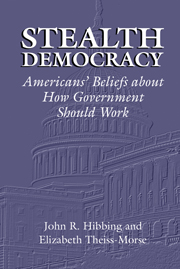Book contents
PART I - THE BENEFITS OF STUDYING THE PROCESSES PEOPLE WANT
Published online by Cambridge University Press: 23 November 2009
Summary
This opening section lays the groundwork for the rest of the book. We take issue with the notion that policy concerns alone drive Americans' political attitudes and behaviors. Instead, we argue that people care at most about one or two issues; they do not care about the vast majority of policies addressed by the government. They want to see certain ends – such as a healthy economy, low crime rates, good schools – but they have little interest in the particular policies that lead to those ends. If this is the case, as we claim, then political scientists should not place policy at the center of the public's political universe.
What do people care about if not policies? We argue that people care deeply about process. Understanding people's process preferences helps solve several mysteries, such as why Americans believe the two major political parties are so similar and the government is so unresponsive to their wishes. People think about process in relatively simple terms: the influence of special interests, the cushy lifestyle of members of Congress, the bickering and selling out on principles. Because they suggest decision makers are taking advantage of the people, these perceived process features make people appear eager to take power away from elected officials.
The centrality of process preferences means they are potentially powerful predictors of people's attitudes toward government. We do not contend that process can explain people's conventional participation in politics or their vote choice between the two major parties.
- Type
- Chapter
- Information
- Stealth DemocracyAmericans' Beliefs About How Government Should Work, pp. 13 - 14Publisher: Cambridge University PressPrint publication year: 2002



